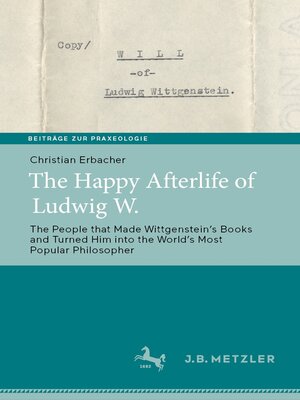The Happy Afterlife of Ludwig W.
ebook ∣ The People that Made Wittgensteinʼs Books and Turned Him into the Worldʼs Most Popular Philosopher · Beiträge zur Praxeologie / Contributions to Praxeology
By Christian Erbacher

Sign up to save your library
With an OverDrive account, you can save your favorite libraries for at-a-glance information about availability. Find out more about OverDrive accounts.
Find this title in Libby, the library reading app by OverDrive.



Search for a digital library with this title
Title found at these libraries:
| Library Name | Distance |
|---|---|
| Loading... |
This book tells a great philosophical tale. The backstory of this tale is simple: the famous philosopher Ludwig Wittgenstein published only one philosophical book during his lifetime: the Tractatus Logico-Philosophicus. He left the lion's share of his philosophical writings to posterity in the form of unpublished manuscripts and typescripts amounting to more than 18,000 pages. In his will, Wittgenstein entrusted three of his former students – Elizabeth Anscombe, Rush Rhees and Georg Henrik von Wright – with the task of publishing from his writings what they thought fit. During the subsequent decades, these literary heirs edited the volumes that the learned world has come to know as the influential works of Wittgenstein. Now, the essays in this book tell about Wittgenstein's literary heirs in their ambition to publish the writings of their beloved teacher. This history of the posthumous publication processes for Wittgenstein's writings will extinguish the genius cult that still exists in some historiographies of philosophy. This cult is partly responsible for the impression that great philosophical works fall from the window of an ivory tower, in completed form, printed and bound, just in order to hit and inspire the next genius philosopher walking by. In actual fact, in the history of philosophy, there are a number of cases in which it takes the great philosophers' pupils and followers to bring their teachers' thought into a publishable form. Indeed, this is how literary tradition of Western philosophy begins. In the case of Wittgenstein's writings, this book opens, at least to some extent, the black box of the discipulary production processes of the making of a classic philosopher.







